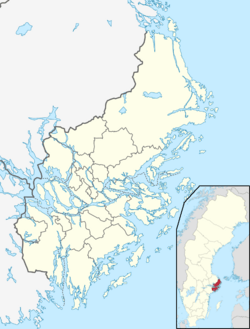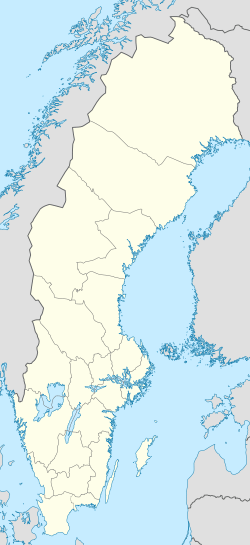Östhamra facts for kids
Quick facts for kids
Östhamra
|
|
|---|---|
| Country | Sweden |
| Province | Uppland |
| County | Stockholm County |
| Municipality | Norrtälje Municipality |
| Area | |
| • Total | 0.78 km2 (0.30 sq mi) |
| Population
(31 December 2010)
|
|
| • Total | 255 |
| • Density | 328/km2 (850/sq mi) |
| Time zone | UTC+1 (CET) |
| • Summer (DST) | UTC+2 (CEST) |
Östhamra is a small place, or "locality," located in Norrtälje Municipality in Sweden. It's part of Stockholm County, which is a larger area in the country. In 2010, about 255 people lived in Östhamra. It is situated just south of the town of Norrtälje.
Contents
Where is Östhamra Located?
Östhamra is found in the eastern part of Sweden. It's specifically in Stockholm County, which is one of the many counties that make up Sweden. This county is known for its capital city, Stockholm, which is a major hub.
Östhamra's Place in Norrtälje Municipality
Östhamra is a part of Norrtälje Municipality. A municipality is like a local government area. Norrtälje Municipality is quite large and includes many towns and smaller communities. Östhamra is located very close to the main town of Norrtälje itself.
Geographical Details of Östhamra
The area of Östhamra is quite small, covering about 0.78 square kilometers. This makes it a compact place where people live. The population density, which tells us how many people live per square kilometer, was around 328 people in 2010.
Understanding Localities in Sweden
In Sweden, a "locality" (or tätort in Swedish) is a special term. It refers to an urban area that has at least 200 inhabitants. These areas are usually built close together, even if they are not officially a city or a town. Östhamra fits this description perfectly with its population of 255 people in 2010.
Climate and Time Zone
Östhamra, like the rest of Sweden, uses Central European Time (CET). This means it is one hour ahead of Coordinated Universal Time (UTC+1). During the summer months, they switch to Central European Summer Time (CEST), which is two hours ahead of UTC (UTC+2). This change helps make the most of the longer daylight hours in summer.



